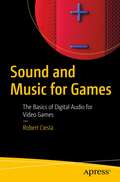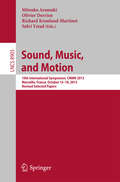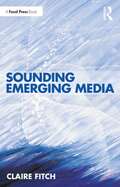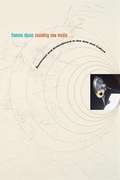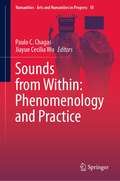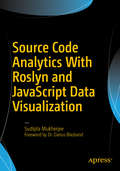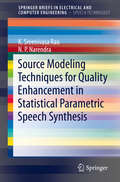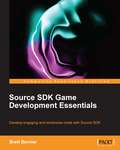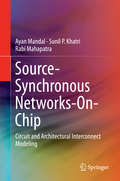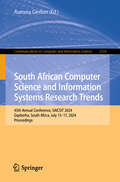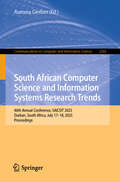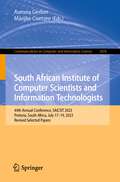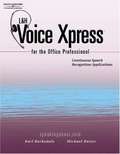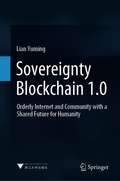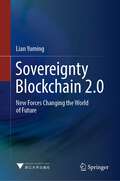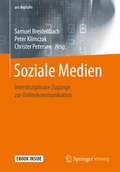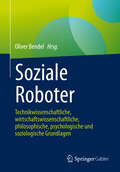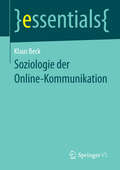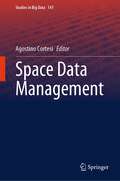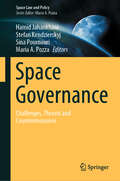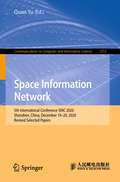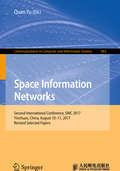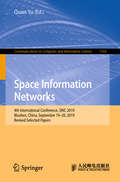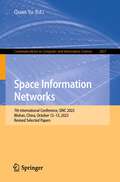- Table View
- List View
Sound and Music for Games: The Basics of Digital Audio for Video Games
by Robert CieslaGrasp the fundamentals of digital audio work in the context of video games, including the basics of middleware such as Fmod and Wwise. We will review software such as Apple's Logic and Garageband, Paul Davis's Ardour, and many other popular digital audio workstations. We will start with an introduction to the basic terminology of digital audio work while also getting acquainted with current generation audio hardware. We will then discuss the basics of the venerable Musical Instrument Digital Interface (MIDI) and how it relates to music composition as well as the tools and techniques for writing tracker music/chiptunes. The book also covers plug-in software, soundproofing at home, and voice work. The book takes a practical approach while tackling both hardware and software components used in cutting edge audio engineering, composition, and audio monitoring. What You Will Learn • Understand the fundamentals of digital audio production in the context of video games • Learn about audio integration with popular middleware solutions and APIs • Leverage plugin effects software to sculpt your audio to professional levels • Identify modern audio file formats and how and when to use them • Learn best practices when mixing sound effects and music for video games Who Is This Book For The intended readership includes beginners in digital audio engineering who use Windows, macOS, or Linux.
Sound, Music, and Motion
by Mitsuko Aramaki Olivier Derrien Richard Kronland-Martinet Sølvi YstadThis book constitutes the thoroughly refereed post-conference proceedings of the 10th International Symposium on Computer Music Modeling and Retrieval, CMMR 2013, held in Marseille, France, in October 2013. The 38 conference papers presented were carefully reviewed and selected from 94 submissions. The chapters reflect the interdisciplinary nature of this conference with following topics: augmented musical instruments and gesture recognition, music and emotions: representation, recognition, and audience/performers studies, the art of sonification, when auditory cues shape human sensorimotor performance, music and sound data mining, interactive sound synthesis, non-stationarity, dynamics and mathematical modeling, image-sound interaction, auditory perception and cognitive inspiration, and modeling of sound and music computational musicology.
Sounding Emerging Media
by Claire FitchSounding Emerging Media details a practice-based approach to sonic art and electroacoustic composition, drawing on methodologies inspired by the production of electronic literature, and game development. Using the structural concepts identified by Gilles Deleuze and Félix Guattari, the book is based around ideas related to labels such as Assemblage, Strata, Smooth and Striated Space, Temporal Space and, The Fold. The processes employed to undertake this research involved the creation of original texts, the development of frameworks for improvisation, the use of recordings within the process and implementation of techniques drawn from the practices of electroacoustic composition, and the use of ideas borrowed from electronic literature, publishing and game development. The results have helped to shape a compositional style which draws on these processes individually or collectively, drawing on practice often seen in game development, visual scores and composition using techniques found in electroacoustic music. Providing a journey through the landscape of emerging digital media, Sounding Emerging Media envisages a world where the composer/user/listener all become part of a continuum of collective artistry. This book is the ideal guide to the history and creation of audio for innovative digital media formats and represents crucial reading for both students and practitioners, from aspiring composers to experienced professionals.
Sounding New Media: Immersion and Embodiment in the Arts and Culture
by Frances DysonThe concept of embodiment, as either a site of resistance to technological incorporation, or a site of excess toward which technology will always aim but never arrive, is no longer adequate to represent the realities of technoculture.
Sounds from Within: Phenomenology and Practice (Numanities - Arts and Humanities in Progress #18)
by Paulo C. Chagas Jiayue Cecilia WuThis book transforms phenomenology, music, technology, and the cultural arts from within. Gathering contributions by performing artists, media technology designers, nomadic composers, and distinguished musicological scholars, it explores a rich array of concepts such as embodiment, art and technology, mindfulness meditation, time and space in music, self and emptiness, as well as cultural heritage preservation. It does so via close studies on music phenomenology theory, works involving experimental music and technology, and related cultural and historical issues. This book will be of considerable interest to readers from the fields of sound studies, science and technology studies, phenomenology, cultural studies, media studies, and sound art theory. This book is equally relevant and insightful for musicians, composers, media artists, sound artists, technology designers, and curators and arts administrators from the performing and visual arts.
Source Code Analytics With Roslyn and JavaScript Data Visualization
by Sudipta MukherjeeLearn how to build an interactive source code analytics system using Roslyn and JavaScript. This concise 150 page book will help you create and use practical code analysis tools utilizing the new features of Microsoft's Roslyn compiler to understand the health of your code and identify parts of the code for refactoring. Source code is one of the biggest assets of a software company. However if not maintained well, it can become a big liability. As source code becomes larger. more complex and accessed via the cloud, maintaining code quality becomes even more challenging. The author provides straightforward tools and advice on how to manage code quality in this new environment. Roslyn exposes a set of APIs which allow developers to parse their C# and VB. NET code and drastically lower the barrier to entry for Meta programming in . NET. Roslyn has a dedicated set of APIs for creating custom refactoring for integrating with Visual Studio. This title will show readers how to use Roslyn along with industry standard JavaScript visualization APIs like HighCharts, D3. js etc to create a scalable and highly responsive source code analytics system. What You Will Learn Understand the Roslyn Syntax API Use Data Visualization techniques to assist code analysis process visually Code health monitoring matrices (from the standard of Code Query Language) Code mining techniques to identify design patterns used in source code Code forensics techniques to identify probable author of a given source code Techniques to identify duplicate/near duplicate code Who This Book is For . NET Software Developers and Architects
Source Modeling Techniques for Quality Enhancement in Statistical Parametric Speech Synthesis (SpringerBriefs in Speech Technology)
by K. Sreenivasa Rao N. P. NarendraThis book presents a statistical parametric speech synthesis (SPSS) framework for developing a speech synthesis system where the desired speech is generated from the parameters of vocal tract and excitation source. Throughout the book, the authors discuss novel source modeling techniques to enhance the naturalness and overall intelligibility of the SPSS system. This book provides several important methods and models for generating the excitation source parameters for enhancing the overall quality of synthesized speech. The contents of the book are useful for both researchers and system developers. For researchers, the book is useful for knowing the current state-of-the-art excitation source models for SPSS and further refining the source models to incorporate the realistic semantics present in the text. For system developers, the book is useful to integrate the sophisticated excitation source models mentioned to the latest models of mobile/smart phones.
Source SDK Game Development Essentials
by Brett BernierThis book is written by a gamer, for a gamer to guide just about anything with Source SDK giving a firm grasp of all the tools it has to offer using step-by-step explanations. If you're a keen gamer who wants a bit more out of your favorite game and create your own modifications (mods) and levels with the Source engine, this book is great for you. No programming and Source SDK experience is required.
Source-Synchronous Networks-On-Chip
by Sunil P. Khatri Ayan Mandal Rabi MahapatraThis book describes novel methods for network-on-chip (NoC) design, using source-synchronous high-speed resonant clocks. The authors discuss NoCs from the bottom up, providing circuit level details, before providing architectural simulations. As a result, readers will get a complete picture of how a NoC can be designed and optimized. Using the methods described in this book, readers are enabled to design NoCs that are 5X better than existing approaches in terms of latency and throughput and can also sustain a significantly greater amount of traffic.
South African Computer Science and Information Systems Research Trends: 45th Annual Conference, SAICSIT 2024, Gqeberha, South Africa, July 15–17, 2024, Proceedings (Communications in Computer and Information Science #2159)
by Aurona GerberThis book contains a selection of the best papers of the 45th Annual Conference, SAICSIT 2024, held in Gqeberha, South Africa, in July 2024. The 26 full papers included in this book were carefully reviewed and selected from 81 submissions. They focus on the transforming relationship between humans and machines. This year's theme is "Human-Machine-Digital-Convergence".
South African Computer Science and Information Systems Research Trends: 46th Annual Conference, SAICSIT 2025, Durban, South Africa, July 17–18, 2025, Proceedings (Communications in Computer and Information Science #2583)
by Aurona GerberThis book contains a selection of the best papers of the 46th Annual Conference of the South AfricanInstitute of Computer Scientists and Information Technologists, SAICSIT 2025, held in Durban, South Africa, during July 17–18, 2025. The 19 full papers included in this book were carefully reviewed and selected from 85 submissions.They were focused on following topical sections : Information Systems and Computer Science.
South African Institute of Computer Scientists and Information Technologists: 44th Annual Conference, SAICSIT 2023, Pretoria, South Africa, July 17–19, 2023, Revised Selected Papers (Communications in Computer and Information Science #1878)
by Marijke Coetzee Aurona GerberThis book contains a selection of the best papers of the 44th Annual Conference, SAICSIT 2023, held in Pretoria, South Africa, in July 2023.The 18 papers presented in this volume were carefully reviewed and selected from 54 regular submissions. They adress various aspects of the role of computer science in connectivity, information systems for connectivity, connecting society and emerging technologies for connectivity
South Western L and H VoiceXpress for the Office Professional
by Karl Barksdale Michael RutterVoice typing is transforming the way people work, write, and enter data. With Voice X Press for the Office Professional, your students can learn the most effective way to use this new software and be able to apply it to the various office applications. This book takes students step-by-step through the speech learning process, providing tips and advice along the way.
South-Western L and H VoiceXpress QuickTorial
by Karl Barksdale Michael Rutter J. Alan BaumgartenThis book contains step-by-step activities that help users master the techniques and extra reinforcement activities that provide enrichment opportunities. Appendices on using the software with Word and WordPerfect are included. Natural language commands are emphasized throughout the text.
Sovereignty Blockchain 1.0: Orderly Internet and Community with a Shared Future for Humanity
by Lian YumingThis book presents a general framework analysis of sovereignty in blockchain based on the concept of blockchain technology, and specifically discusses the three theoretical foundations of sovereignty in blockchain: data sovereignty theory, social trust theory, and smart contract theory. It also explores the evolution of laws concerning data and digital rights, how to build trust mechanisms for digital rights transactions, as well as contract signing and the implementation of digital rights transactions.
Sovereignty Blockchain 2.0: New Forces Changing the World of Future
by Lian YumingThis book is a continuation and deepening of Sovereign Blockchain 1.0. It mainly includes three views: 1) Blockchain is a super public product based on digital civilization. 2) The Internet is an advanced level of industrial civilization, the core of which is connection; blockchain is an important symbol of digital civilization, the essence of which is reconstruction. 3) Digital currency will trigger a comprehensive change in the economic field, and digital identity will reconstruct the governance model in the social field, thereby changing the order of civilization.This book is not only a popular science book based on blockchain thinking, theory and application research, but also a scholarly work on the technical and philosophical issues of governance and the future. By reading Sovereign Blockchain 2.0, policymakers can quickly understand the basic knowledge and frontier dynamics of science and technology; science and technology workers can grasp the general trend, seize opportunities, face problems and difficulties, aim at the world's science and technology frontier and lead the direction of science and technology development; experts and scholars in law and legal fields can see new ideas, concepts and models of data governance; social science researchers can discover data sociology and data philosophy issues.
Soziale Medien: Interdisziplinäre Zugänge zur Onlinekommunikation (ars digitalis)
by Peter Klimczak Christer Petersen Samuel BreidenbachBildeten noch vor wenigen Jahren Presse, Rundfunk und Fernsehen den primären Zugang der Gesellschaft zu sich selbst, sind heutige gesellschaftliche Debatten sowie das Phänomen der Öffentlichkeit in hohem Maße durch den Einfluss von Social Media geprägt. Das Neue der dortigen Kommunikation ist, dass sie durch algorithmische Selektionen vorgeformt wird, in hohem Maße personalisiert ist und Beiträge automatisierter Accounts enthalten kann. Diese Charakteristika stellen die Forschung in der Einordnung und Bewertung des gesellschaftlichen Einflusses von Social Media-Debatten immer noch vor Schwierigkeiten und verlangen nach transdisziplinären Ansätzen. Beiträge aus der Informatik und den Computational Humanities ergänzen deshalb die medien- und kommunikationswissenschaftlichen Perspektiven jeweils um eine Beschreibung der technischen Grundlagen ihrer Untersuchungsgegenstände und der möglichen Zugänge zum Objektbereich.
Soziale Roboter: Technikwissenschaftliche, wirtschaftswissenschaftliche, philosophische, psychologische und soziologische Grundlagen
by Oliver BendelSoziale Roboter sind sensomotorische Maschinen, die für den Umgang mit Menschen oder Tieren geschaffen wurden. Sie können über fünf Dimensionen bestimmt werden, nämlich die Interaktion mit Lebewesen, die Kommunikation mit Lebewesen, die Nähe zu Lebewesen, die Abbildung von (Aspekten von) Lebewesen sowie – im Zentrum – den Nutzen für Lebewesen. Bei einem weiten Begriff können neben Hardwarerobotern auch Softwareroboter wie gewisse Chatbots, Voicebots und Social Bots dazu zählen. Die Disziplin, die soziale Roboter – ob als Spielzeugroboter, als Serviceroboter (Pflegeroboter, Therapieroboter, Sexroboter, Sicherheitsroboter etc.) oder als Industrieroboter in der Art von Kooperations- und Kollaborationsrobotern (Co-Robots bzw. Cobots) – erforscht und hervorbringt, ist die Soziale Robotik. Das Buch schafft Grundlagen in technikwissenschaftlicher, wirtschaftswissenschaftlicher, philosophischer, psychologischer und soziologischer Hinsicht. Es stellt dar, was soziale Roboter ausmacht, wie sie gebaut und programmiert werden, welche Anwendungsmöglichkeiten existieren und welche Herausforderungen sich ergeben.Das Kapitel 2 wird auf link.springer.com unter der Creative Commons Namensnennung 4.0 International Lizenz veröffentlicht.
Soziologie der Online-Kommunikation (essentials)
by Klaus BeckVon einem kommunikationssoziologisch fundierten und medientheoretisch differenzierten Medienbegriff ausgehend wird eine Systematik der Online-Kommunikation entwickelt und begründet. In diesem Zusammenhang werden Medien als institutionalisierte und technisch basierte Zeichensysteme zur organisierten Kommunikation und das Internet als technische Plattform oder Mediennetz verstanden. Es werden Kriterien entwickelt sowie unterschiedliche Systematisierungsansätze diskutiert, um einzelne Internetdienste als Modi der Online-Kommunikation bzw. Handlungsrahmen computervermittelter Kommunikation zu beschreiben.
Space Data Management (Studies in Big Data #141)
by Agostino CortesiThe book presents latest results pertaining to challenges faced by researchers in space data management. There are large number of highly important applications that currently rely upon data from satellites and space missions, ranging from weather prediction to monitoring of environmental pollution, climate change, marine traffic, agriculture, and urban planning, etc. The quality and quantity of space data poses new and specific challenges to the scientific community, covering the entire life cycle of space data management and with a need for an interdisciplinary approach. The chapters written by experts discusses impacts of these challenges, and report activities that can stimulate new research.
Space Governance: Challenges, Threats and Countermeasures (Space Law and Policy)
by Hamid Jahankhani Stefan Kendzierskyj Maria A. Pozza Sina PournouriThis book delves into the complexities of space governance, offering innovative solutions for a sustainable future. From the pressing issues facing space governance today to creating a consensus on responsibility, ethics, and frameworks, we aim to answer key questions: (i) What are the current challenges? (ii) How do satellites impact society? (iii) What are the potential negative consequences? From communication and early warning systems to global broadcasting and navigation, satellite technology plays a pivotal role in our daily lives. However, this reliance also exposes vulnerabilities, as any disruption to satellite systems could have disastrous consequences across multiple industries. The rapid development of satellite technology, including drones and UAVs, has ushered in a new era of exploration and exploitation. Yet, this progress brings with it new challenges, particularly in terms of governance. As satellites transcend national boundaries, the dynamics of space governance become increasingly complex, with various entities pursuing their own interests without always considering the broader implications. This book bridges the knowledge gap surrounding space technology and highlights the need for increased governance frameworks, data protection, and disciplined deployment. By addressing issues of control, privacy, and security, we pave the way for a more sustainable and responsible approach to space exploration. Join us on this journey as we navigate the evolving landscape of space governance and chart a course towards a brighter future for all.
Space Information Network: 5th International Conference SINC 2020, Shenzhen, China, December 19–20, 2020, Revised Selected Papers (Communications in Computer and Information Science #1353)
by Quan YuThis book constitutes selected and revised papers of the 5th International Conference on Space Information Networks, SINC 2020, held in Shenzhen, China, in December 2020.The 11 full and 2 short papers presented in this volume were carefully reviewed and selected from 104 submissions. The papers present the latest research in the fields of space information networks.
Space Information Networks
by Quan YuThis book constitutes the proceedings of the First International Conference on Space Information Network, SINC 2016, held in Kunming, China, in August 2016. The 18 full and 6 short papers presented in this volume were carefully reviewed and selected from 139 submissions. The theme of the conference encompasses new progress and development tendency of the space information network and related fields, There were 3 sections in the proceedings of SINC 2016 including the model of space information network and mechanism of high performance networking, theory and method of high speed transmission in space dynamic network, and sparse representation and fusion process in space information.
Space Information Networks: 4th International Conference, SINC 2019, Wuzhen, China, September 19–20, 2019, Revised Selected Papers (Communications in Computer and Information Science #1169)
by Quan YuThis book constitutes the proceedings of the 4th International Conference on Space Information Networks, SINC 2019, held in Wuzhen, China, in September 2019.The 16 full and 7 short papers presented in this volume were carefully reviewed and selected from 118 submissions. The papers are organized in topical sections on architecture and efficient networking mechanism; theories and methods of high speed transmission.
Space Information Networks: 7th International Conference, SINC 2023, Wuhan, China, October 12–13, 2023, Revised Selected Papers (Communications in Computer and Information Science #2057)
by Quan YuThis book constitutes revised selected papers from the thoroughly refereed proceedings of the 7th International Conference on Space Information Network, SINC 2023, held in Wuhan, China, during October 12–13, 2023. The 8 full papers and 5 short papers included in this book were carefully reviewed and selected from 73 submissions. The papers present the latest research in the fields of space information networks.
